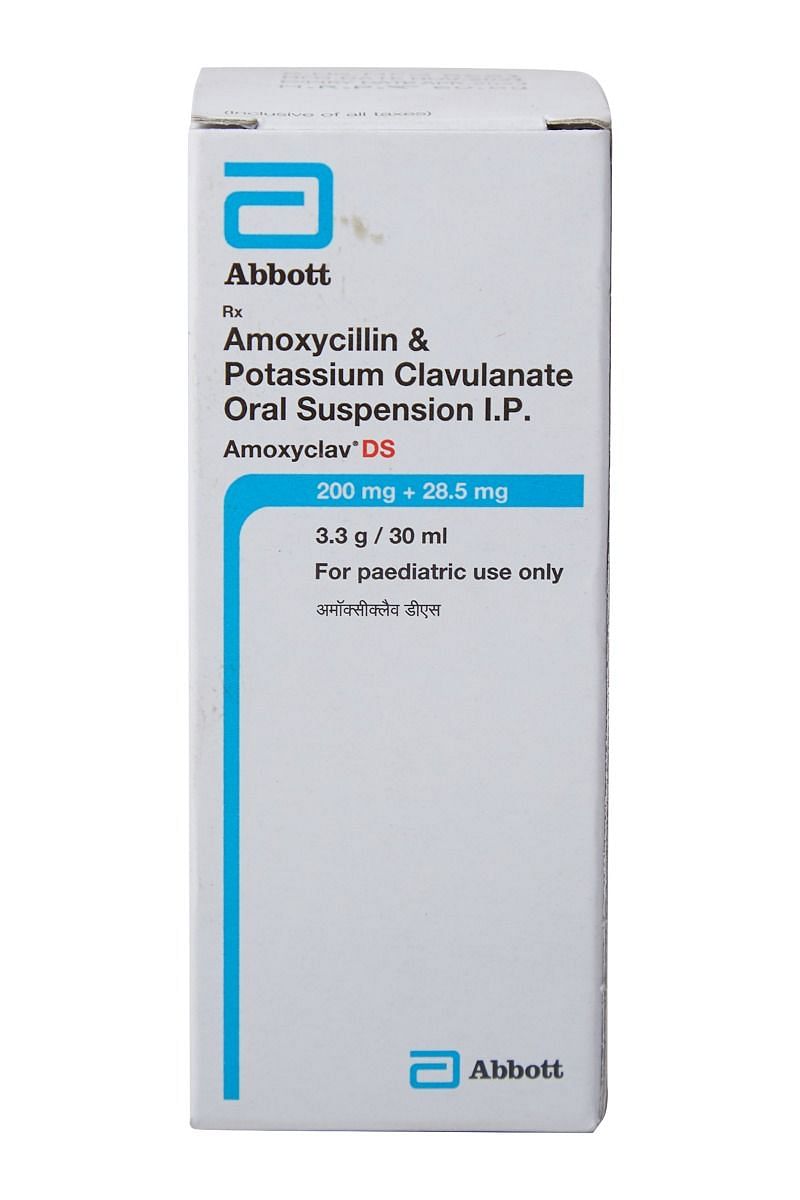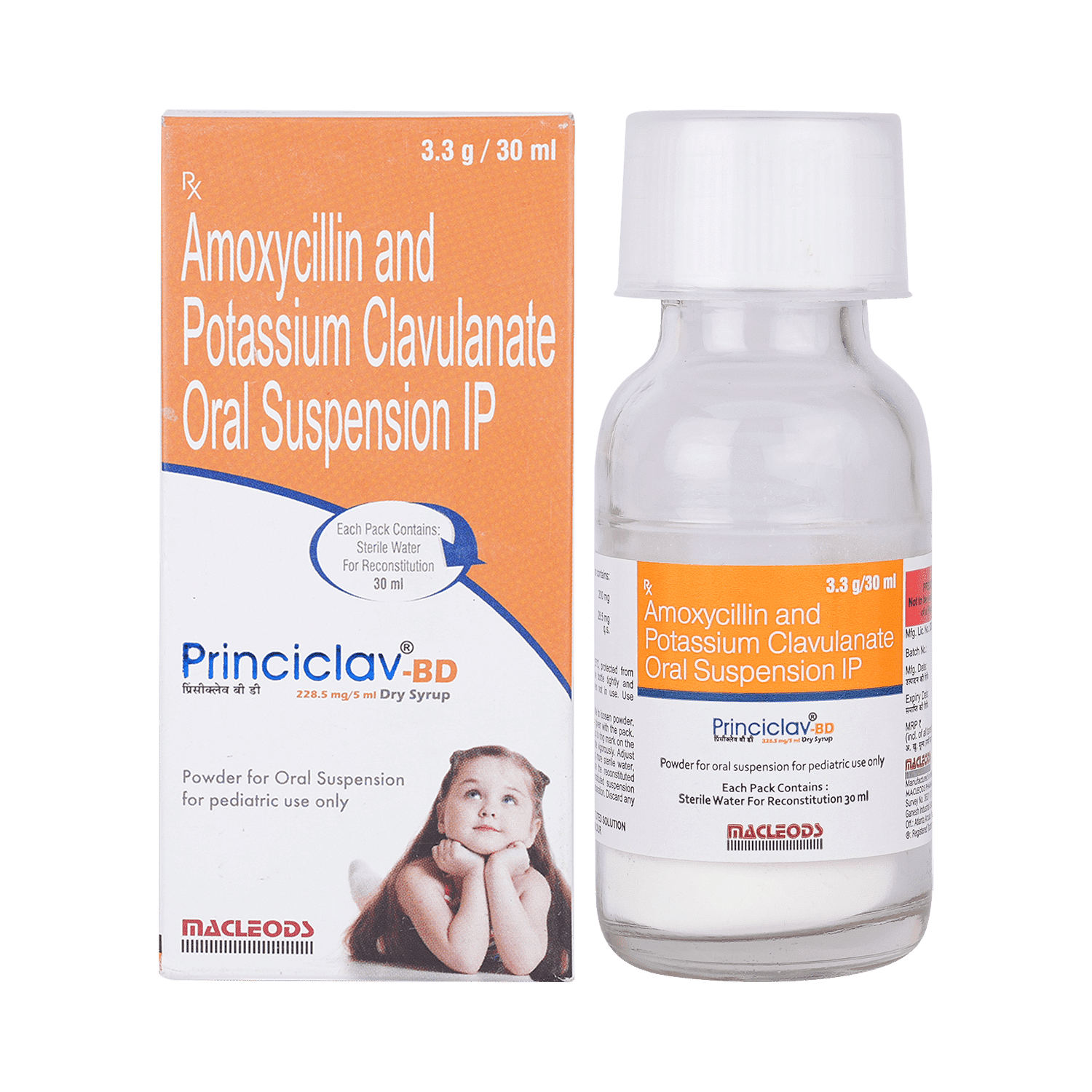
Moxylik Dry Syrup
Manufacturer
Nuliek Healthcare
Salt Composition
Amoxycillin (200mg) + Clavulanic Acid (28.5mg)
Key Information
Short Description
Moxylik Dry Syrup is an antibiotic medicine that helps treat bacterial infections of the ear, nose, throat, chest, lungs, teeth, skin, and urinary tract.
Dosage Form
Dry Syrup
Introduction
Moxylik Dry Syrup is an antibiotic medicine that helps treat bacterial infections of the ear, nose, throat, chest, lungs, teeth, skin, and urinary tract. It is capable of killing bacteria that have become resistant to other therapies and thus also helps treat tuberculosis that is resistant to other treatments.
Directions for Use
Your child must complete the entire course of antibiotics. Stopping too soon may cause the bacteria to multiply again or cause another infection.
Safety Information
Side Effects
Bitter taste in the mouth after intake Diarrhea Itchy rash Facial swelling Breathing difficulty
How it works
Moxylik Dry Syrup is an antibiotic. It has two active agents amoxycillin and clavulanic acid. Amoxycillin works by preventing the formation of the bacterial protective covering (cell wall) essential for the survival of the bacteria. Whereas clavulanic acid serves a special purpose of inhibiting an enzyme (beta-lactamase) that is produced by resistant bacteria.
Quick Tips
Your child must complete the entire course of antibiotics Encourage your child to drink plenty of water in case diarrhea develops as a side effect Never give Moxylik Dry Syrup until and unless prescribed by the doctor Do not give Moxylik Dry Syrup to treat common cold and flu-like symptoms caused by viruses Check 'expiry' before giving Moxylik Dry Syrup to your child
Related Medicines

Moxikind-CV Dry Syrup

Advent 228.5mg Dry Syrup Tangy Orange

Amoxyclav Dry Syrup

Mpx-CV Dry Syrup

S Mocy CL Dry Syrup

Dentoclav 200mg/28.5mg Dry Syrup

Moxtive Clav Dry Syrup

Aldomox Dry Syrup

Princiclav -BD Dry Syrup

Rzcv Bid Dry Syrup
Frequently asked questions
Can other medications be given alongside Moxylik Dry Syrup?
Yes, but it's essential to inform your child's doctor about any other medicines they're taking before starting Moxylik Dry Syrup. Additionally, consult with their doctor before administering any new medication.
Can my child receive vaccinations while on treatment with Moxylik Dry Syrup?
Generally, antibiotics like Moxylik Dry Syrup do not interfere with vaccine ingredients or cause adverse reactions in children who have just been vaccinated. However, it's recommended to wait until the child has recovered from the illness before getting vaccinated.
What lab tests might my child undergo while taking Moxylik Dry Syrup for an extended period?
Prolonged therapy may require monitoring of kidney and liver function tests periodically to ensure your child's condition remains stable.
Can I give a higher dose of Moxylik Dry Syrup than recommended?
No, exceeding the recommended dose can increase the risk of side effects. If your child experiences worsening symptoms, consult with their doctor for reassessment.
Can I stop giving Moxylik Dry Syrup when my child's symptoms improve?
No, it's crucial to complete the full course of treatment even if symptoms seem to be improving. This ensures the infection is fully cleared and the medicine continues to exert its beneficial effects.
Does Moxylik Dry Syrup cause diarrhea?
Yes, this medication can lead to diarrhea due to its antibiotic properties and potential impact on beneficial bacteria in the stomach. If diarrhea persists, encourage your child to drink plenty of fluids and consult with their doctor if signs of dehydration appear.
Do all viral common colds result in secondary bacterial infections?
Typically, bacterial infections do not follow viral infections. Using antibiotics for a viral infection can increase the risk of side effects. Consult with your child's doctor before administering antibiotics.
Is yellow-green mucus from my child's nose an indication of a bacterial infection?
No, this symptom is usually associated with a common cold and does not necessarily require antibiotic treatment. Symptoms often last 7-10 days.
Are there any signs that indicate my child needs immediate medical attention?
Yes, if your child experiences severe allergic reactions, gastrointestinal infections, or liver damage (characterized by weakness, paleness, and vomiting), seek medical attention immediately.


